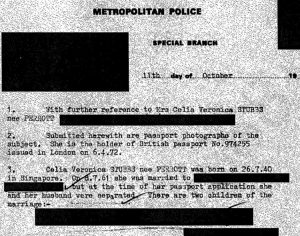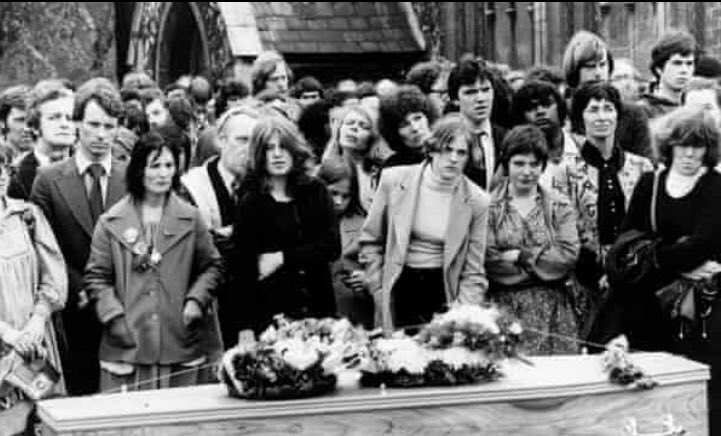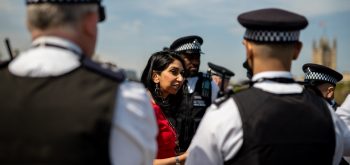The police monitored the partner of anti-racist campaigner Blair Peach for almost three decades after his death as a result of being struck by a police officer at demo in 1979. The Undercover Policing Inquiry has heard from Celia Stubbs’ representatives who stated that the surveillance ‘commenced in the 1970s and continued at least into the 1990s’. According to , Sam Jacobs of Doughty Street Chambers instructed by Bhatt Murphy, surveillance ‘followed Celia’s campaign on the death of Blair & other justice campaigns, including in founding INQUEST and her involvement in the Hackney Community Defence Association and Colin Roach Centre’.
Blair Peach died in April 1979 after attending a demonstration against the National Front in Southall, West London after being struck on the head ‘with an unauthorised weapon such as a lead-weighted cosh or police radio’. No officer was prosecuted over his death. But, in 2010, it was revealed that the police had concealed a report of an internal investigation that said it could ‘reasonably be concluded that a police officer” struck the blow to the head which killed Peach in 1979’.
In 1979 an anti-racist activist & teacher, Blair Peach, was killed by a a police officer at a demo in Southall. We can now reveal how the police spied on Blair & his partner Celia Stubbs before his killing & continued to spy on Celia for decades afterwards. Here’s what we know 🧵 pic.twitter.com/CBqfBpDFJX
— Bhatt Murphy (@BhattMurphy) May 11, 2022
Jacobs described both Stubbs and Peach as ‘law-abiding’ and said there ‘was never any justification for the covert policing’. The Inquiry was presented with heavily redacted documents to evidence the surveillance which were gained by Bhatt Murphy through a Data Protection Act application to the Metropolitan Police. Jacobs stated that the police had not submitted the documents to the inquiry themselves and tried to resist the application.
The documents included a 1978 Special Branch report containing details of Peach’s car and his relationship with Stubbs, as well as a police report following his death which concerned individuals who had made statements to the police about Peach’s death. Jacobs also described how one undercover officer recalled that ‘one of management’ had asked him to attend Peach’s funeral.
‘A useful propaganda tool for the left-wing publicity machine’
Sam Jacobs described the Special Branch narrative as revealed by the documents as ‘disturbing’. An undated report described Stubbs coming to notice in 1976. ‘Celia Stubbs became a useful propaganda tool for the left-wing publicity machine,’ the report said. ‘… She would appear to be a member of the pressure group Inquestpurely because of association with Peach.’
 Sam Jacobs said: ‘Celia Stubbs’ partner had been killed by a police officer and the circumstances of her death were known to the police but concealed until April 2010… Her campaigning was valiant and it was dignified. For Special Branch, however, she was “a propaganda tool for the left-wing publicity machine”. We say it reveals the utterly misplaced disdain for justice campaigns that drove this policing. It was this institutional mentality or mindset which left the SDS and Special Branch more broadly willing to engage in the gross invasions of privacy that it was committing to obtain information that had no legitimate purpose.’
Sam Jacobs said: ‘Celia Stubbs’ partner had been killed by a police officer and the circumstances of her death were known to the police but concealed until April 2010… Her campaigning was valiant and it was dignified. For Special Branch, however, she was “a propaganda tool for the left-wing publicity machine”. We say it reveals the utterly misplaced disdain for justice campaigns that drove this policing. It was this institutional mentality or mindset which left the SDS and Special Branch more broadly willing to engage in the gross invasions of privacy that it was committing to obtain information that had no legitimate purpose.’
Another document was the Special Branch report of a 1982 meeting of INQUEST attended by 12 people. ‘There seems to be little doubt that INQUEST has sprung out of Celia Stubbs’ desire to keep the Blair Peach affair in the public gaze. She realises interest has waned and she has hit upon the idea of revising it and linking it up with other notorious cases of recent years. Most of the others involved are merely looking for a cause to adhere. Without Stubbs, the group would simply not exist however they are articulate and committed types and it does not seem beyond the bounds of possibility that they would eventually achieve quasi-respectable status of groups such as NCCL (now Liberty).’
Jacobs stated that the actions of the police had been twofold: first ‘reporting on the activities of groups which sought to hold officers to account for their actions’ and second ‘destruction or withholding of evidence […] that would have been reputationally damaging and of assistance to those groups in their campaigns’. Overall, he submitted that the aim was ‘to protect the police themselves from having to account for their actions’, rather than to protect the public.
His statement concluded with a quote from Celia Stubbs: ‘To put it bluntly, police officers took my partner’s life & then concealed the truth. The concluding job of this Inquiry is to uncover the truth.’
The Undercover Policing Inquiry was launched in March 2015 and will continue until at least 2023.







